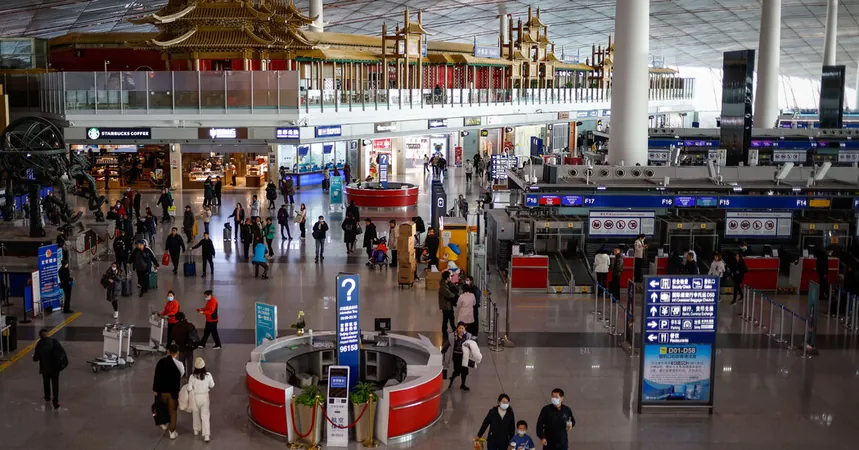
Hong Kong’s Economic Evolution: Navigating a New Era in China
2024-12-16
Author: Wai
Introduction
As the world watches with bated breath, Hong Kong stands at a crucial crossroads. With Financial Secretary Paul Chan embarking on public consultations for the 2025/26 Budget, the city grapples with the pressing task of upholding its capitalist spirit amidst the complexities of the 'One Country, Two Systems' framework. The backdrop of these developments is the anticipated return of Donald Trump to the American presidency in January 2025. This event could shift the geopolitical landscape significantly, creating both challenges and opportunities for Hong Kong as it seeks to solidify its strategic position.
Geopolitical Landscape
Trump’s expected confrontational policies towards China, which may include hefty tariffs and stringent technology restrictions, cast a shadow over Hong Kong’s future. However, this climate of tension also opens doors for the city to redefine its role within China’s vast economic landscape. Hong Kong's longstanding advantages—its common law system, unfettered information flow, and commitment to transparent governance—are poised to become even more vital as China navigates its path in the global economy.
Role in China's Economic Strategy
Analyzing Hong Kong’s transformation is essential within the context of the broader Chinese economic strategy. Recent insights from Beijing’s Politburo meetings underscore the financial sector's pivotal role in fueling economic progress, especially in the realms of technological innovation. Thus, reinforcing Hong Kong’s status as China’s international financial hub is paramount for the city’s future growth trajectory.
Strategic Initiatives for Economic Relevance
In order to catapult itself into a new age of economic relevance, three strategic initiatives are set to take center stage:
1. Elevating Communication Platforms
A revitalization of English-language broadcasting, particularly through RTHK and other media outlets, is critical in reshaping international perceptions of Hong Kong. This initiative goes beyond mere public relations; it emphasizes the necessity for the city to emerge as a credible international voice that can articulate the narratives of both Hong Kong and China on the global stage.
2. Northern Metropolis Future Centre
Envisioning the establishment of a center focusing on the Northern Metropolis could facilitate smoother integration with mainland markets. This platform would allow for crucial stakeholder interactions, addressing the complex dynamics of economic integration while safeguarding Hong Kong's unique identity.
3. Economic Development Board
The proposed Economic Development Board could serve as a coordinating body for the city’s transformative efforts, ensuring that Hong Kong’s growth aligns with both local and national objectives. Importantly, this does not necessarily imply an extensive bureaucratic expansion; rather, it suggests a thoughtful reorganization of existing resources to maximize efficiency.
Conclusion
The ultimate challenge lies in striking a balance between deeper integration with mainland China and the preservation of Hong Kong’s distinct identity. The city must adeptly leverage its hallmark features—like the rule of law, respect for human rights, press freedom, and transparent governance—while concurrently adopting a proactive stance in supporting China’s economic evolution.
As the 2025/26 Budget draws near, it becomes clear that this financial roadmap is not just an annual ritual; it’s a golden opportunity to lay down a visionary blueprint for Hong Kong's future—a future that embraces both continuity and innovative change. By maintaining its unique advantages while responding to the new geopolitical realities, Hong Kong can assert itself as an irreplaceable conduit between China and the world economy.
As global economic power continues to shift towards the East, Hong Kong’s role as a vital international financial center will only grow in significance. The city’s adeptness in managing international capital flows, coupled with its deep understanding of both Western and Chinese business paradigms, positions it as an essential player in amplifying China’s economic voice. This is Hong Kong’s moment to shine, not just as a financial hub, but as a pivotal agent of change in a transforming world.





 Brasil (PT)
Brasil (PT)
 Canada (EN)
Canada (EN)
 Chile (ES)
Chile (ES)
 España (ES)
España (ES)
 France (FR)
France (FR)
 Hong Kong (EN)
Hong Kong (EN)
 Italia (IT)
Italia (IT)
 日本 (JA)
日本 (JA)
 Magyarország (HU)
Magyarország (HU)
 Norge (NO)
Norge (NO)
 Polska (PL)
Polska (PL)
 Schweiz (DE)
Schweiz (DE)
 Singapore (EN)
Singapore (EN)
 Sverige (SV)
Sverige (SV)
 Suomi (FI)
Suomi (FI)
 Türkiye (TR)
Türkiye (TR)